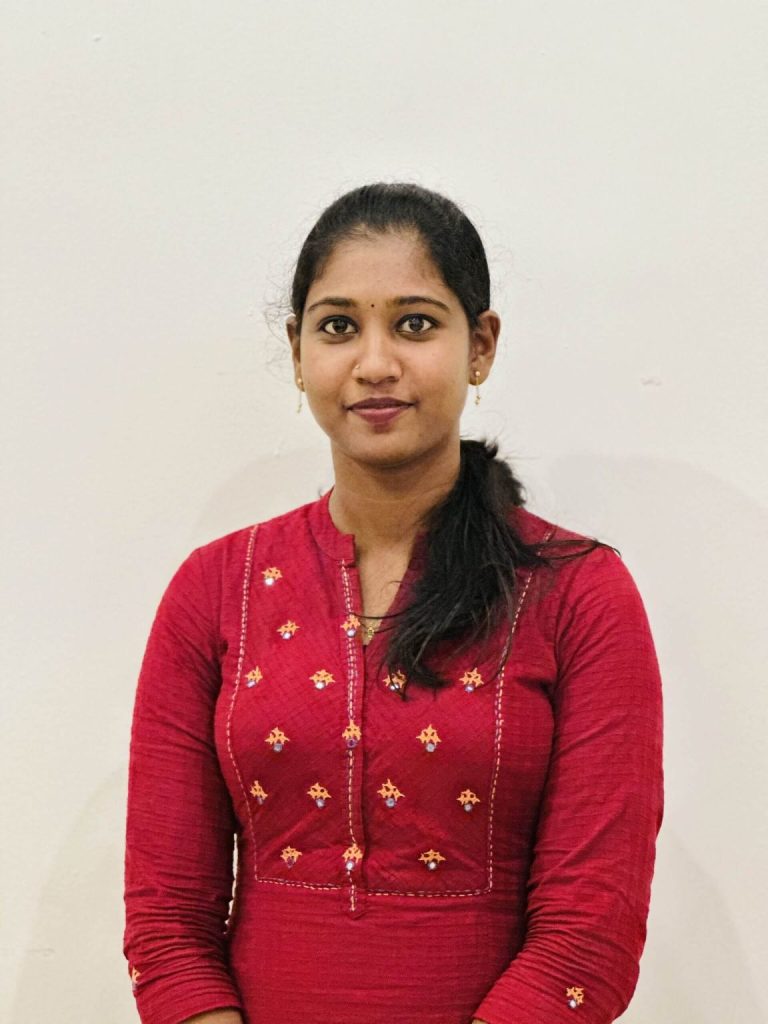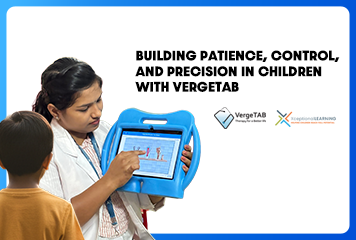Child Lacks Patience and Control? Activities That Build Precision and Self-Regulation Using VergeTAB
21 Nov 2025

In classrooms and therapy sessions, educators and therapists often notice children who lack patience, rush through tasks, and struggle to control their actions. These difficulties affect precision, learning quality, and the child’s ability to complete activities calmly and accurately.
Traditional worksheets or general learning apps do not provide the structured, guided practice needed to help children slow down, focus, and build self-regulation in a measurable way.
VergeTAB, used together with the XceptionalLEARNING platform, is implemented in schools and therapy clinics to deliver distraction-free, goal-based digital activities specifically designed to improve precision, patience, and self-control in children.
Talk to our team on WhatsApp
Understanding the Core Skills
Before exploring the activities, let’s understand why these three skills matter:
Patience: Helps children wait, observe, and plan their actions instead of reacting immediately.
Control: Encourages careful movement, steady hands, and awareness of body motion.
Precision: Improves accuracy, spatial awareness, and fine motor coordination.
Together, these skills form the foundation for daily routines—from eating and dressing to writing and problem-solving.
Challenges in Developing These Skills
Children with developmental delays often face challenges that make patience, control, and precision harder to cultivate:
- Short attention span: Maintaining focus can be difficult.
- Impulsivity: Acting without thinking or rushing tasks.
- Motor control difficulties: Fine motor skills may be underdeveloped, making precision tasks frustrating.
- Emotional regulation: Children may become easily irritated or anxious with complex tasks.
Traditional tools may not provide enough engagement for repeated practice, which is why technology-based interventions like VergeTAB can be transformative.
Struggling to help your child develop patience, self-control, or precision?
VergeTAB offers structured activities that strengthen focus and task accuracy.
Chat with our team on WhatsApp for guidance
I. Patience: Learning to Wait, Observe, and Plan
Children often want instant results. But patience is the key to handling frustration, completing multi-step tasks, and following structured routines. VergeTAB includes interactive activities that make waiting rewarding and observation exciting.
1. The Slow Build Challenge
Objective: Teach children how to wait, observe, and act only when it’s time.
How It Works:
- The screen displays a blank structure, such as a garden or tower.
- Pieces appear one by one after a few seconds.
- The child must patiently wait for each new piece before placing it.
- If they rush, the structure resets or the bonus points decrease.
Therapeutic Focus:
Encourages delayed gratification, attention span, and planning skills.
Why It Works on VergeTAB:
Visual cues, slow-paced animations, and soft sound feedback make the waiting process calm, enjoyable, and engaging — ideal for children who need structured sensory experiences.
Age/Skill-Level Suggestions:
4+
Stepwise Simplification: Reduce the number of pieces and increase wait times for younger children or those with severe delays.
2. Drip Collection Challenge
Objective: Build focus and timing control through anticipation.
How It Works:
- Droplets fall at irregular intervals into a virtual container.
- Children must tap only when the droplet reaches a certain height.
- Early or late taps result in missed points, encouraging accurate timing.
Therapeutic Focus:
Develops patience, rhythm, and hand-eye coordination.
Why It Works on VergeTAB:
The platform adapts droplet speed according to performance, helping children practice timing while receiving immediate feedback, which reduces frustration.
Age/Skill-Level Suggestions:
4–6
Stepwise Simplification: Slower droplet speed and fewer drops for beginners.
3. Story Sequencer Pause
Objective: Teach patience through gradual story completion.
How It Works:
- A short story appears panel by panel.
- Each panel opens after a set wait time.
- The child must arrange each new scene correctly before moving on.
Therapeutic Focus:
Enhances sequencing, attention to order, and comprehension.
Why It Works on VergeTAB:
The slow unfolding of stories allows therapists to observe the child’s reaction to delay, helping reinforce calm responses and anticipation control.
Age/Skill-Level Suggestions:
5+
Stepwise Simplification: Use shorter stories or fewer panels for younger children or severe delays.
II. Control: Building Steadiness and Awareness
Control is not just physical — it’s emotional and mental, too. VergeTAB helps children learn how to manage movement, apply steady pressure, and maintain focus even under gentle challenges.
1. Fine-Motion Labyrinth
Objective: Train steady hand movements and navigation control.
How It Works:
- The child guides a ball through a digital maze using gentle finger movement.
- Touching walls restarts the maze, teaching controlled correction.
- Paths gradually get narrower or include soft-moving barriers.
Therapeutic Focus:
Improves fine motor control, visual tracking, hand stability, and concentration.
Why It Works on VergeTAB:
Children can use their fingers or a stylus for realistic touch feedback, allowing therapists to measure accuracy and improvement over time.
Age/Skill-Level Suggestions:
5+
Stepwise Simplification: Start with wider paths and fewer barriers for beginners.
2. Balance Beam Challenge
Objective: Strengthen coordination and awareness of steady motion.
How It Works:
- A digital character walks across a narrow bridge while holding items.
- The child drags the character slowly along the path using touch.
- Moving too fast or off-path resets the level, teaching controlled movement.
Therapeutic Focus:
Enhances motor planning, hand control, and persistence.
Age/Skill-Level Suggestions:
5+
Stepwise Simplification: Widen the path and reduce items for younger children or severe delays.
Why It Works on VergeTAB:
The screen’s motion sensitivity allows realistic practice of balancing skills in a safe digital environment, perfect for children who need controlled motion tasks.
3. Virtual Clay Sculpting
Objective: Develop precise hand movements and shape recognition.
How It Works:
- Children drag and position digital shapes to match outlines or templates.
- Shapes snap into place when correctly aligned, providing immediate visual feedback.
Therapeutic Focus:
Builds hand-eye coordination, spatial awareness, and goal-directed movement.
Why It Works on VergeTAB:
Digital pressure feedback mimics tactile responses, making it effective for children who need to understand hand pressure differences.
Age/Skill-Level Suggestions:
4+
Stepwise Simplification: Use larger shapes and fewer items for beginners or severe delays.
III. Precision: Learning Accuracy and Spatial Awareness
Precision skills help children align, measure, and complete tasks that require focus. VergeTAB uses visual coordination exercises to make accuracy a fun and confidence-building experience.
1. Target Drop Challenge
Objective: Enhance hand-eye coordination and timing.
How It Works:
- Children drop objects into targets from various heights.
- Targets move slightly to challenge coordination.
- Points are awarded for perfect alignment.
Therapeutic Focus:
Reinforces controlled release, visual-motor timing, and spatial judgment.
Why It Works on VergeTAB:
Instant feedback shows whether the object landed correctly, helping children learn through success and gentle correction.
Age/Skill-Level Suggestions:
5+
Stepwise Simplification: Use larger targets and slower objects for beginners.
2. Digital Balance Scale Challenge
Objective: Strengthen logical reasoning and careful movement.
How It Works:
- Children drag weights onto each side of a digital scale.
- The goal is to balance it perfectly.
- The game introduces real-world comparisons, like apples and blocks.
Therapeutic Focus:
Builds analytical thinking, attention to measurement, and fine motor control.
Why It Works on VergeTAB:
The adaptive scale mimics real physics—ideal for combining maths, motor coordination, and critical thinking in a sensory-friendly way.
Age/Skill-Level Suggestions:
6+
Stepwise Simplification: Start with fewer items or smaller numbers for younger children.
3. Rotating Maze Key
Objective: Teach alignment, timing, and problem-solving through motion.
How It Works:
- A key must pass through a rotating maze without touching the sides.
- Each turn requires careful timing and movement alignment.
- Higher levels introduce new paths and speeds.
Therapeutic Focus:
Develops fine precision, reaction control, and spatial orientation.
Why It Works on VergeTAB:
The activity simulates real-life alignment challenges (like unlocking doors) in a digital format, making it relatable and transferable to daily skills.
Age/Skill-Level Suggestions:
6+
Stepwise Simplification: Use slower rotations or simpler paths for younger children or severe delays.
In real therapy and classroom environments, these skills are practiced using VergeTAB in a controlled, distraction-free setup designed specifically for special education and therapy use. Schools and clinics use VergeTAB along with XceptionalLEARNING to ensure structured skill development and measurable progress.
See how VergeTAB works in real sessions
Real-World Applications
VergeTAB activities build essential life skills that extend beyond digital learning:
Patience: Helps children wait calmly, follow daily routines step by step, and take turns in games or class.
Control: Improves careful movement, tool use, and safe handling—like carrying a tray, writing neatly, or pouring drinks.
Precision: Enhances accuracy and focus for real tasks such as stacking toys, organizing items, or threading beads.
Example:
A child who practices patience, control, and precision on VergeTAB may later wait calmly while cooking, carry a lunch tray without spilling, or pour water into a cup with steady hands.
Expected Outcomes
With regular use of VergeTAB and the XceptionalLEARNING platform, children can experience:
- Behavioural Growth: Better patience, reduced impulsivity, and improved emotional control.
- Cognitive Development: Sharper focus, sequencing, and planning skills.
- Motor Improvement: Stronger hand-eye coordination and fine motor control.
- Functional Independence: Greater confidence in self-care, classroom, and daily activities.
Conclusion
Developing patience, control, and precision can be life-changing for children with developmental delays. If your school or clinic is looking for a practical way to build these skills using a dedicated therapy device, VergeTAB provides a safe, guided, and distraction-free digital environment built specifically for special education and therapy.
Request a VergeTAB Demo
Talk to our team on WhatsApp for institutional enquiries


